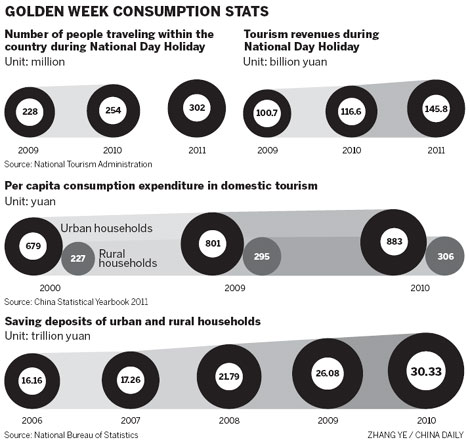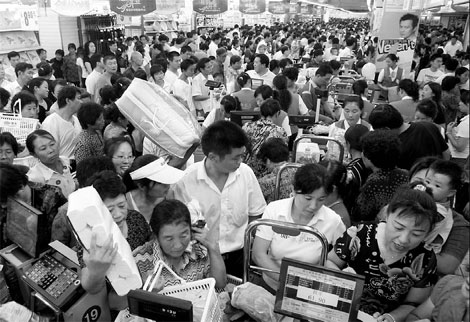Golden Week shines for shops
Updated: 2011-10-18 08:07
By Yang Ning (China Daily)
|
|||||||||
|
Thousands of customers shopping at a newly-opened supermarket in Qingdao, in East China's Shandong province, on Oct 2, the second day of the week-long National Day Holiday. Zang Lei / For China Daily |
Happy retailers report record-breaking rise of 17.5 percent y-o-y from National Day vacation
BEIJING - The country's week-long National Day Holiday running from Oct 1 to Oct 7, dubbed the "Golden Week" for businesses, saw a record-breaking 696.2 billion yuan ($109.4 billion) in sales for retail and catering industries, up 17.5 percent year-on-year, figures from the Ministry of Commerce showed.
The holiday also set another record of more than 300 million Chinese residents traveling within the country and abroad.
According to tourism administrative authorities, 119 tourist spots monitored by the Ministry of Commerce nationwide received more than 24.33 million visitors, a year-on-year increase of 8.8 percent, with tourism revenues rising 10.6 percent year-on-year to about 1.24 billion yuan.
"The tourist boom represented a robust consumption demand in the domestic market - despite inflationary pressure - and also represented optimism and confidence in the economic outlook of the world's second largest economy," said Liang Da, an economist with the National Bureau of Statistics (NBS).
Chinese tourists also brought a boon to foreign countries.
According to a recent report released by the World Luxury Association on Chinese overseas consumption over the Golden Week, the total value of luxury commercial goods bought by outbound Chinese tourists amounted to 26 billion euros ($35.49 billion), equivalent to that of the domestic market for luxury goods over three consecutive months. The average per capita consumption was between 2,000 and 8,000 euros.
Money was spent mainly on brand-name fashion items, French cosmetics, perfume and leather goods, said the report, adding that Chinese tourists replaced Japanese and European consumers as the world's biggest buyer of luxury goods during the seven days.
The consumption growth was in line with that seen in the nation's retail sector this year. The total retail sales of consumer goods jumped 17 percent year-on-year to 1.47 trillion yuan in August while sales in the first eight months this year hit 11.5 trillion yuan, up 16.9 percent from a year earlier, the most recent data from the NBS showed.
Liang said the so-called holiday economy is positive in promoting economic growth, creating business opportunities and spurring growth in consumer demand with transportation systems, including railway and aviation seeing new growth highs.
The consumer and tourist boom during the Golden Week holiday was interpreted by Liang as the "volcano-style release" of Chinese people's potential buying strength.
By the end of August, urban residents' bank savings deposits reached 32.7 trillion yuan, according to the NBS.
"As the rapid development in social security and the welfare system in recent years addresses residents' concerns about housing, healthcare, education and so forth, consumer demand is stimulated by people's willingness to spend," Liang said.
Vincent Lui, a Hong Kong-based partner and managing director of Boston Consulting Group, said China continues to lead the world with the strongest consumer sentiment and appetite to spend.
"Based on our study earlier this year, Chinese consumers' willingness to spend continues to rise, with 35 percent of surveyed residents planning to increase their spending this year, up 13 percentage points from the previous year," said Lui.
The accelerated spending growth should remain in place going forward, boosted by steady increases in urban wages, said Bank of America Merrill Lynch in a report.
"Chinese consumers were upbeat during the Golden Week," Lu Ting, a Hong Kong-based economist at Merrill Lynch, said.
"We expect China's consumer growth to remain stable, backed by rapid wage growth, relatively stable confidence in the domestic economy and the rapid accumulation of wealth of Chinese households," said Lu.
Jason Ding, partner and vice-president of Roland Berger Strategy Consultants, said the strong growth showed China's domestic consumer-stimulation package is continuing to make an impact.
"Our recent market research shows consumer growth is especially strong in the country's lower-tier cities," he said.
China's rapid urbanization is another factor stimulating consumption, Liang at NBS said.
Urban residents made up 49.9 percent of the total population last year compared with 17.9 percent in 1978, according to Liang.
He said urban consumption now accounted for about 70 percent of the total, following the increase in the urban population over the past decade. In the past five years, the urban population increased more than 10 million on average annually.
"A 1 percentage point rise in urbanization, equaling an influx of 1 to 1.2 million from rural areas to cities, will lead to a rise of 1.6 percentage points in consumption growth, because consumption by the urban population is 2.7 to 3 times that of their rural counterparts," Liang said.
The rural areas remained "a potential for larger consumption", said Liang, adding that the living standards of the 700 million people who live in rural areas (nearly 50 percent of the total) is expected to rise to the level of their urban counterparts, which will be a huge stimulus to the economy.
"The influx of migrant workers into the cities also led to changes in perspective on how to consume, resulting in a growth in consumption demand and a change in consumption structure," he said.
However, consumption still has the potential to grow given the relatively low per capita percentage of people who own durable consumer goods in China such as automobiles and telecommunication products. It is even lower than some other developing countries, Liang added.
Chen Keyu contributed to this story
China Daily

(China Daily 10/18/2011 page14)










